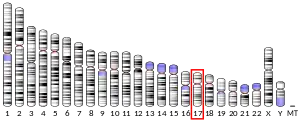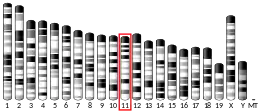MYH13
Myosin-13 also known as myosin, heavy chain 13 is a protein which in humans is encoded by the MYH13 gene.[5]
| MYH13 | |||||||||||||||||||||||||
|---|---|---|---|---|---|---|---|---|---|---|---|---|---|---|---|---|---|---|---|---|---|---|---|---|---|
| Identifiers | |||||||||||||||||||||||||
| Aliases | MYH13, MyHC-IIL, MyHC-eo, myosin, heavy chain 13, skeletal muscle, myosin heavy chain 13 | ||||||||||||||||||||||||
| External IDs | OMIM: 603487 MGI: 1339967 HomoloGene: 55780 GeneCards: MYH13 | ||||||||||||||||||||||||
| |||||||||||||||||||||||||
| |||||||||||||||||||||||||
| |||||||||||||||||||||||||
| Orthologs | |||||||||||||||||||||||||
| Species | Human | Mouse | |||||||||||||||||||||||
| Entrez | |||||||||||||||||||||||||
| Ensembl | |||||||||||||||||||||||||
| UniProt |
| ||||||||||||||||||||||||
| RefSeq (mRNA) | |||||||||||||||||||||||||
| RefSeq (protein) |
| ||||||||||||||||||||||||
| Location (UCSC) | Chr 17: 10.3 – 10.37 Mb | Chr 11: 67.32 – 67.37 Mb | |||||||||||||||||||||||
| PubMed search | [3] | [4] | |||||||||||||||||||||||
| Wikidata | |||||||||||||||||||||||||
| |||||||||||||||||||||||||
Function
MYH13 is a myosin whose expression is restricted primarily to the extrinsic eye muscles which are specialized for function in eye movement.[6]
References
- GRCh38: Ensembl release 89: ENSG00000006788 - Ensembl, May 2017
- GRCm38: Ensembl release 89: ENSMUSG00000060180 - Ensembl, May 2017
- "Human PubMed Reference:". National Center for Biotechnology Information, U.S. National Library of Medicine.
- "Mouse PubMed Reference:". National Center for Biotechnology Information, U.S. National Library of Medicine.
- Winters LM, Briggs MM, Schachat F (November 1998). "The human extraocular muscle myosin heavy chain gene (MYH13) maps to the cluster of fast and developmental myosin genes on chromosome 17". Genomics. 54 (1): 188–9. doi:10.1006/geno.1998.5558. PMID 9806854.
- Weiss A, Schiaffino S, Leinwand LA (July 1999). "Comparative sequence analysis of the complete human sarcomeric myosin heavy chain family: implications for functional diversity". J. Mol. Biol. 290 (1): 61–75. doi:10.1006/jmbi.1999.2865. PMID 10388558.
Further reading
- Weiss A, McDonough D, Wertman B, et al. (1999). "Organization of human and mouse skeletal myosin heavy chain gene clusters is highly conserved". Proc. Natl. Acad. Sci. U.S.A. 96 (6): 2958–63. doi:10.1073/pnas.96.6.2958. PMC 15877. PMID 10077619.
- Schachat F, Briggs MM (2002). "Phylogenetic implications of the superfast myosin in extraocular muscles". J. Exp. Biol. 205 (Pt 15): 2189–201. PMID 12110653.
- Trynka G, Zhernakova A, Romanos J, et al. (2009). "Coeliac disease-associated risk variants in TNFAIP3 and REL implicate altered NF-kappaB signalling". Gut. 58 (8): 1078–83. doi:10.1136/gut.2008.169052. PMID 19240061. S2CID 17111427.
- Lehner B, Sanderson CM (2004). "A protein interaction framework for human mRNA degradation". Genome Res. 14 (7): 1315–23. doi:10.1101/gr.2122004. PMC 442147. PMID 15231747.
- Schjeide BM, McQueen MB, Mullin K, et al. (2009). "Assessment of Alzheimer's disease case-control associations using family-based methods". Neurogenetics. 10 (1): 19–25. doi:10.1007/s10048-008-0151-3. PMC 2841132. PMID 18830724.
- Shoeman RL, Sachse C, Höner B, et al. (1993). "Cleavage of human and mouse cytoskeletal and sarcomeric proteins by human immunodeficiency virus type 1 protease. Actin, desmin, myosin, and tropomyosin". Am. J. Pathol. 142 (1): 221–30. PMC 1886840. PMID 8424456.
This article is issued from Wikipedia. The text is licensed under Creative Commons - Attribution - Sharealike. Additional terms may apply for the media files.



